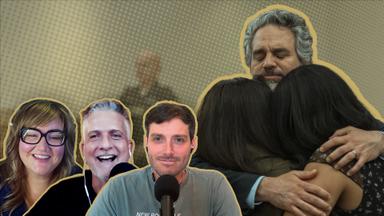
In The Picture of Dorian Gray, Oscar Wilde wrote that “there is no such thing as a moral or an immoral book. Books are well written, or badly written. That is all.” He did sort of undercut his own argument by writing about a character whose immorality corrupts a piece of art, but whatever: The point is that the purpose of a book (or, you know, a TV show) isn’t ethical edification—the stuff of tragic morality plays and religious parables—but aesthetic declaration.
But in times like these, as true morality and empathy become increasingly rare commodities (not that they were all that common in Wilde’s era), there’s something to be said for a story that takes on the question of a moral life as its subject. HBO’s Task, despite all its trappings of biker gangs, vernal Pennsylvania hunting grounds, and flattened Delco vowels, is ultimately a story about good people, and what it really means to be one. You hear it again and again: Anthony Grasso pays tribute to Lizzie Stover by saying she was a good person; Robbie Prendergrast lets Tom Brandis go because he can tell he’s decent; when Robbie asks Shelley Wilkins why he should trust her, she simply offers that she’s a “good person.” Most of Task’s characters are trying to find a way to do the right thing, even as their pasts have seemingly put the right thing out of reach.
The question of what makes a good person has been a pretty defining one through the (now perhaps waning) era of prestige TV. So many of that golden age’s signature series let that question play out through an antihero who showed glimmers of goodness—or at least allowed viewers to imagine it—despite an otherwise one-directional descent into sociopathy: Tony Soprano sure loved his ducks and horses, even if he also beat men to death; Walter White may have let a woman die (among lots of other people), but it was just to save Jesse Pinkman and, he could tell himself, his own family. As each season went on, they and the other TV antiheroes in their midst—Don Draper, Jimmy McNulty, Saul Goodman, et al.—made choices that rendered them almost irredeemable, but not quite, as audiences alternately celebrated and mourned their loss of humanity.
Task asks the same questions as so many of these shows: What makes a good person? What’s the turning point where you lose that goodness? And can you ever come back from it? But, by its end, and despite all the hullabaloo about its unrelenting bleakness, Task offers a more hopeful answer. After you strip away the elaborate cops-and-robbers plotting, its themes are fairly obvious: Robbie, Tom, Grasso, and the rest of Task’s cast of characters, all “a million miles past good ideas,” have to decide on the right thing to do with what they have left, after mistakes have been made and losses have taken their toll. They have to figure out how to, or whether to, forgive themselves and the people around them. They’re living in a fallen world, to borrow a very Catholic idea, and the way forward will always be imperfect, with no right choices left because of all the wrong ones that have already been made.
The often flawed decision-making of Task’s characters, particularly its trinity of sad-eyed men, gives the show its stakes and possibilities. Robbie burgles drug houses both to get revenge and to preserve his family. Grasso can rationalize trading secrets to the Dark Hearts because the money he gets from it supports his sister and her kids. Even Jayson kills Billy—the inciting event of the series—to keep his family together. Those inner moral conflicts culminate in external ones, the robberies and shoot-outs and betrayals that propel the show’s plot. All those set pieces are thrilling, sure, even if all the whizbang convergences of FBI agents, Dark Hearts, and assorted innocents start to feel a little convenient by the time the finale comes around. But what’s really at the heart of Task is the moral deliberation that sets up those confrontations in the first place—and the quieter conversations in which these characters mull over the state of their souls, even as they try to conceal how far they’ve fallen. The title of the finale, “A Still Small Voice,” points, in not so still and small a way, to the significance of those quieter moments between characters.
In the exchange between Tom and Robbie in Episode 5 and the one between Tom and Grasso in Episode 6, there’s time to air out the questions about redemption that these characters have been dwelling on all season. Tom, as a former priest would, encourages both Robbie and Grasso to turn back from the paths they’re on. And Tom himself confesses to his own sins: He still hasn’t visited or spoken to his son, Ethan, after his wife’s death. It’s an attempt at trading one confession for another, a show of faith to get Robbie and Grasso to divulge what’s haunting them, too. In each case, the conversation veers (or is steered) toward the religious, as Tom and Robbie discuss life after death and Tom and Grasso get into the nature of forgiveness. Does God really wash away your sins, or will he confront you with them if, and when, you have to face him? Is there anything that’s really and truly irredeemable?
Tom doesn’t quite accomplish what he wanted in either conversation; Robbie still goes to Bushkill, and Grasso doesn’t turn himself over then and there. But each interaction does achieve something else: Robbie seems to convince Tom of the deep-down rightness of his intentions, laying the groundwork for a bond between them that ultimately protects Maeve and his kids, even though it couldn’t save Robbie himself. The two seem to sense a kindred spirit, and even if Tom couldn’t change Robbie’s mind, Robbie seems to have changed Tom’s. And Grasso, unlike Robbie, does change course; maybe their talk, in part, gives him the assurance that his immortal soul can still be saved.
In the finale, we get another in this series of quiet conversations. Tom speaks to his old friend Father Daniel about a family that may want to adopt the passed-along, too-pure-for-this-world Sam Nance, whom Tom has taken in and, over time, treated like his own son. This time, Father Daniel is the still, small voice of conscience, urging Tom to do what’s best for Sam instead of himself—which, guttingly, means letting him go.
All these men are questing toward an elusive goodness, and a new direction for each one of them comes out of the quiet conversations they share. Task doesn’t make the achievement of that goodness too cut-and-dried; things never seem to get all the way better for the wayward men and women of Delaware County. Robbie dies along the way, getting some measure of satisfaction out of his revenge quest but not quite completing what he’d set out to do. Grasso intervenes to save Maeve and gets some sense of faith back—along with the forgiveness of Tom and, maybe, God—but he has to live with the damage he’s caused and what’s likely to be a curtailed future. And Tom still doesn’t have his wife, and the decision he makes to allow Sam to be adopted by another family is more proof that the right choice isn’t necessarily a good or easy one. But the moments of connection and forgiveness they have along the way somehow make the show and these lives less bleak. And in each case, even as these men acknowledge their own brokenness and trail of bad choices, they do what they can to step in for the other, younger people around them—Maeve, Harper, Wyatt, Sam, and Ethan, who all get some measure of hope that they won’t be stuck with the same bad choices that Robbie, Grasso, and Tom were.
This complicated sense of morality, and the way we see it reveal itself between these characters, is what elevates a show like this from a good one to a great one. Task may have never attracted the same viewership or watercooler conversation as its Pennsylvania-set predecessor, Mare of Easttown. There was never a mystery driving viewers to Reddit for speculation and obsession. We always knew who the criminal was; we just didn’t always know why he’d made the choices he did, or where he’d end up. Task was a quieter and often more meditative show, its greatness in all those in-between moments and hushed conversations. The show also didn’t lean quite as hard into the specificities of Wawa and Fruit Ninja and the cluttered, cozy homes of Delco, but what it lacked in throwaway details it made up for with questions bigger than all of us: redemption, forgiveness, and how we give it to the ones who need it the most because, at least on the surface, they’re the ones who deserve it the least.




